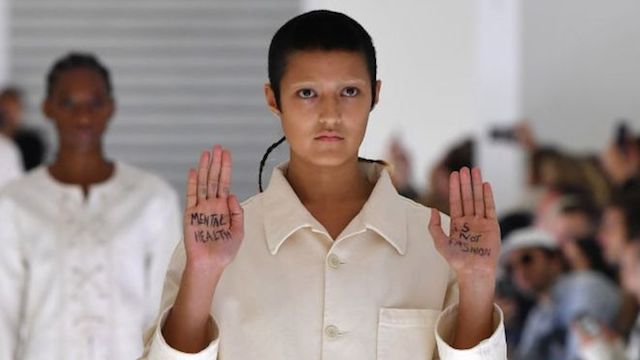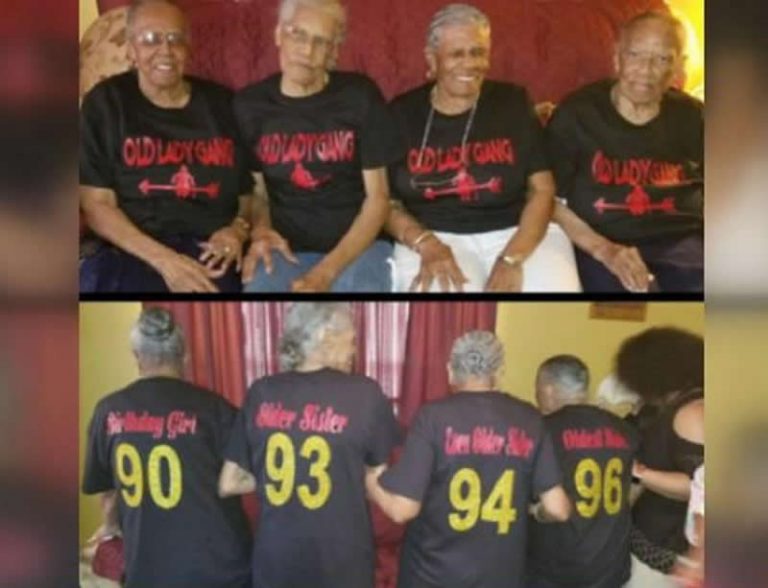Gucci Model Donates Catwalk Fee To Mental Health Charities
- Home
- Gucci Model Donates Catwalk Fee To Mental Health Charities

Gucci Model Donates Catwalk Fee To Mental Health Charities
A British model who staged a silent protest over Gucci using straitjackets at Milan Fashion Week will donate their fee to mental health charities.
Ayesha Tan Jones, who identifies as non-binary, appeared on the catwalk with the words “mental health is not fashion” written on their palms during the show.
The 26-year-old tells Radio 1 Newsbeat the straitjackets were “vulgar” and “triggering” for some of the models involved.
Gucci has responded saying it was taken out of context and was part of a broader concept about breaking free.
In a statement issued on Instagram, the brand said that the clothes represent “how through fashion, power is exercised over life, to eliminate self-expression”.
‘I’m just fed up’
“We are constantly being judged for our bodies and our image, and although we are privileged, in many ways, we also have fragile mental health issues.
“Models are not given the space to have a voice when it comes to what designers put them in, what clothes they have to wear.
“One of the things that sparked this protest was that I’m just fed up,” she adds. “I’ve been modelling for 12 years now. It felt contradictory for me to not speak out and use this platform.”
Ayesha says other models are also donating their fee to mental health charities.

“I felt like it was my responsibility to speak up for those people who are struggling with their mental health on a daily basis.
“Getting out of bed and getting ready for the day, that takes a lot of bravery when you’re suffering. For me, doing this on the catwalk was in honour of that.
“We need to support people who are going through mental health issues, because they are the real heroes.”
“Many of the other Gucci models who were in the show felt just as strongly as I did about this depiction of straitjackets, and without their support I would not have had the courage to walk out and peacefully protest,” they wrote.
Gucci’s Creative Director, Alessandro Michele, said the use of straitjackets were part of the creative process.
“I wanted to show how society today can have the ability to confine individuality and that Gucci can be the antidote. For me, the catwalk was the journey from conformity to freedom and creativity.
“Uniforms, utilitarian clothes, such as straightjackets, were included on the runway as the most extreme version of restriction imposed by society and those who control it.
“These clothes were a statement as part of a performance that set the context for the fashion show that followed.”
‘Uncomfortable watch’
But Vanessa Friedman, Chief Fashion Critic from the New York Times, tells Newsbeat that she thinks the metaphor was not clear and the fashion house had not given enough consideration to the way it would be perceived.
“I was surprised when the straitjackets came out. I’d done an interview with Alessandro backstage and he hadn’t talked about it.
“I think designers need to address issues that are current and it works best when it is obvious what is being challenged. In this particular show it wasn’t clear what was going on. It was an uncomfortable situation to watch.
“The fashion industry has an increasingly important role to play when it comes to topics like mental health. Runway shows didn’t used to be scrutinised but as their platforms become more giant, they are being looked at.”
Vanessa thinks fashion is getting to grips with its responsibility on a global stage, but it needs to do more.
It’s not the first time Gucci has faced criticism.
In February, the brand withdrew a jumper from sale because it “resembled blackface”. The black jumper covered the lower half of the face and featured a red cut-out around the mouth.
And in May, the brand was criticised for selling a headpiece resembling a turban, which was accused of being insensitive towards the Sikh religion. It prompted a backlash on social media after the US-based Sikh Coalition posted a tweet saying: “The Sikh turban is not just a fashion accessory, but it’s also a sacred religious article of faith.”
Gucci apologised for any offence caused, and said it was committed to increasing diversity.
The Milan-based fashion label appointed its first diversity chief, Renée Tirado, in July.
Source: BBC
- Share
Classic Ghana
Classic Ghana brings you into a fun world of arts, entertainment, fashion, beauty, photography, culture and all things in between. Let’s explore these together!







